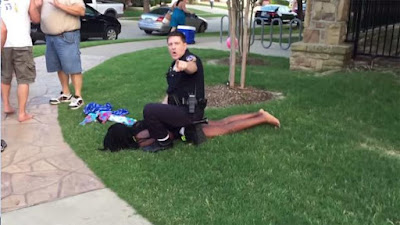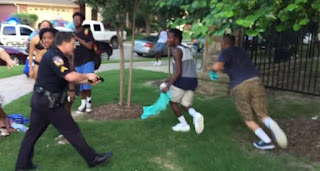William Grigg | Pro Libertate
“The President of the United States should say to all children … here’s the rule, kids: When the cop tells you to go, you go,” declared Rudolph Giuliani. “You say, `Yes, sir, no sir. Yes, police officer; no, police officer. You don’t disrespect a police officer. He’s a symbol of authority.”
The besetting problem of our era, we are insistently told by police and their apologists, is not widespread abuse and other misconduct by law enforcement officers, but increasing “disrespect for authority” that is being abetted by “liberals” and those even more dreadful people called “libertarians.”
“Young people [are] disrespecting authority,” O’Reilly complained, pandering to the prejudices of his superannuated and incurious audience by insisting that “young people in America, especially teenagers, have a defiance toward authority not seen since the Vietnam days.” So pronounced is this social affliction, according to O’Reilly’s diagnosis, that the entire population under the age of 25 should be written off as a “lost generation” – a proposal he made with blithe indifference to an audience roughly three times that age.Giuliani’s comments were made during an interview with Fox News herd-poisoner Bill O’Reilly following the host’s recital of a familiar jeremiad.
“If you were around in the late 1960s and early 1970s, you know that history is repeating itself,” pontificated O’Reilly. Young people subject to enslavement through conscription grew distrustful of government – understandably so, as any reasonable person would point out. O’Reilly, a stranger in the house of reason, laments that this healthy distrust “led to a breakdown of authority, and the rise of the `Sex, drugs, and rock-and-roll’ era.”
O’Reilly’s personal legal history powerfully suggests that he is not a martyr to sexual self-restraint. For his part, Giuliani’s colorful carnal dissipations offer an interesting counterpointto his stern public moralizing, the central theme of which is the unconditional duty for unqualified submission to “authority” as embodied by the political class and its armed emissaries.
 “Freedom is about authority,” Giuliani explained in a 1994 speech. “Freedom is about the willingness of every single human being to cede to lawful authority a great deal of discretion about what you do.”
“Freedom is about authority,” Giuliani explained in a 1994 speech. “Freedom is about the willingness of every single human being to cede to lawful authority a great deal of discretion about what you do.”
In that formula – “freedom” through submission to state “authority” – we hear echoes of Mario Palmieri, the chief ideologist of Benito Mussolini’s Fascist Party.
“According to Fascism, a true, a great spiritual life cannot take place unless the State has risen to a position of pre-eminence in the world of man,” wrote Palmieri in The Philosophy of Fascism(pg. 99). “The curtailment of liberty thus becomes justified at once, with this need of raising the State to its rightful position.”
The State’s “rightful position,” from this perspective, is one of ownership. As the property of the State, the individual is free to do only that which is permitted by those who act in its name. When a police officer, “a symbol of authority,” addresses a Mundane, he does so from a position of ownership. This is what the term “authority” means.
People have authority over only that which legitimately belongs to them – beginning with their physical selves and the content of their thoughts, and extending to such things as the property they have acquired through legitimate commerce or inheritance, and the performance of services that have been promised through freely negotiated and agreed contracts.
In his Second Treatise, John Locke pointed out that parents have authority within their home to care for and educate their children. However, children themselves – contrary to the Roman doctrine of patria potestas – are not the property of their parents. The duty of parents is to care for, protect, and instruct children in sound morality as they learn to take ownership of their lives. Successful parenting instills in children an understanding of, and respect for, the Golden Rule, which requires reciprocal respect for property rights.
As Jeffrey Tucker of the Foundation for Economic Education recently pointed out, it is possible to have a police system that focuses entirely on the protection of property rights. Tucker likes to smoke, and he doesn’t like having the government tell him where and when he can indulge that habit. In fact, as a self-described anarchist, Tucker – a free market economic analyst – doesn’t like government at all, particularly law enforcement.
Yet when a police officer in Atlantic Station, Georgia explained to Tucker that smoking was prohibited, Tucker readily complied – because Atlantic Station is, in effect, a privatized city. Tucker recognized that property rights include the ability to enforce rules that visitors must obey.
Police in Atlantic Station are employed by business owners and merchants and answer to them, rather than a political clique. The rules of the enclave are strict, but not onerous. Rather than detaining people and filing charges for trivial misbehavior, police – acting as peace officers – encourage or, when necessary, compel them to leave. As Tucker observes, “The right to … walk away makes all the difference.”
Similar arrangements existed within mining camps, wagon trains, cattle drives, and other pre-political arrangements in the Mountain West before the arrival of government and what we’re expected to call “civilization.” People who cherish liberty understand that order exists where property rights are protected – and that the protection of property is too important to be left to the State. This is best accomplished through what conservatives often call “mediating institutions,” such as private associations and, most importantly, the family.
Ironically, people of O’Reilly’s cast of mind are entirely correct in lamenting the disintegration of the family and the increasingly barbarized condition of our culture. This is not because Americans are becoming impudently disdainful of “authority.” Worship of “authority” – meaning armed people given State authorization to kill – is ubiquitous in contemporary America, as is the contempt for property rights that characterizes every collectivist society in terminal decline. In keeping with Screwtape’s prescription, statists are seeking to fix the public mind on the vice of which we are least in danger.
Public “authority,” O’Reilly and others of his persuasion instruct us, is a uniquely fragile thing, particularly when exercised by police officers. It appears to be a “Clap for Tinkerbell” proposition: Unless we truly believe in the authority of the police, they cannot protect us.The authoritarian formula peddled by Fascists both ancient – Palmieri and his comrades – and contemporary – O’Reilly, Giuliani and their ilk – requires that parents indoctrinate children in the protocols of submission to the State and its agents. This has nothing whatsoever to do with the Golden Rule, either as a matter of public policy or as a restraint on the private behavior of those who urge authoritarian nostrums on the rest of us.
—-> Continue to full article at Pro Libertate.
Source Article from http://filmingcops.com/cops-brutality-isnt-the-problem-its-kids-who-disrespect-our-authority/
 RSS Feed
RSS Feed















 June 16th, 2015
June 16th, 2015  FAKE NEWS for the Zionist agenda
FAKE NEWS for the Zionist agenda 


 Posted in
Posted in 













